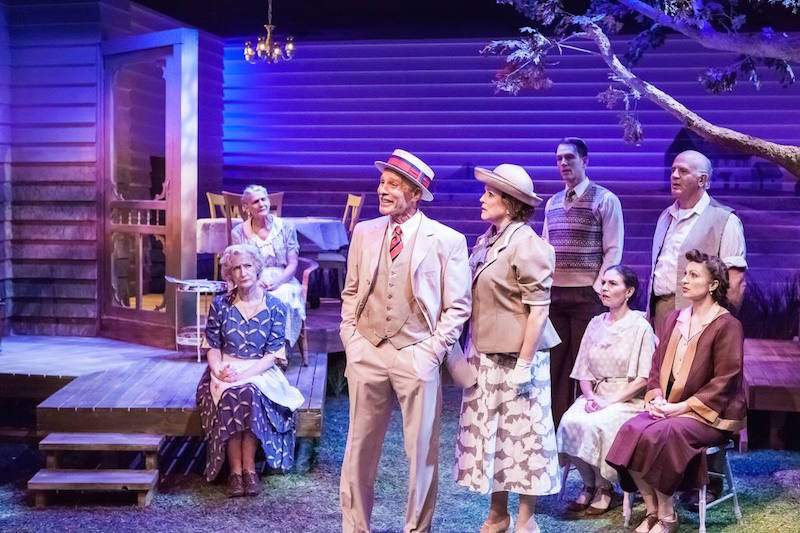Review: Purple Rose's Morning’s At Seven mines gentle humor in family conflict

Paul Osborne’s Morning’s At Seven treads lightly on themes of personal disappointment, repressed feelings, and unrelieved tension in a small town Midwest.
Osborne’s sympathy for this world out-of-sync is given a respectful and well-performed staging by the Purple Rose Theatre in Chelsea. Osborne, who grew up in Kalamazoo and went on to great success as a playwright and screenwriter, creates gentle comedy from material and settings that William Inge would later turn into steamy drama in Come Back Little Sheba, Picnic and other works.
Osborne’s approach is low-key and knowing and director Michelle Mountain captures that tone and the sometimes bittersweet nature of Osborne’s comedy. The staging also evokes through set, music, and soft lighting the particulars of place and time, 1938.
Morning’s centers around four sisters who live near each other in a small, rural Midwestern town. They are getting up in years, the oldest is 72 and the others are in their 60s. Their ambitions have been small, home centered, but underneath are disappointments never openly expressed.
Cora lives with her husband Theodore, called Thor, and her younger never-married sister Aaronetta Airie. Next door is sister Ida, whose husband Carl has mental-emotional problems. Their son, the well-named Homer, is 40 and has never left home. A few blocks away is Esther. Her husband David is a retired professor who disdains his wife’s family and openly dismisses them as a pack of morons.
The quiet disruption that motivates the play is provided by Homer, who brings home his girlfriend of many years, Myrtle. He visits her in the city but has never introduced her to his family. He’s never asked her to marry him and he’s never moved into the house that his father built for the couple.
Homer suffers from the same doubts and lack of confidence that torture his father. Meanwhile, the house sits empty and Aunt Cora wants it.
What makes this work to some extent is actors who can delve deeply and sympathetically into the motivations, pains, and sly humor of these characters, who in the hands of a lesser playwright and/or a less focused cast could become rube stereotypes ripe for contempt.
At the heart of the play is Aaronetta, the “old maid.” Laural Merlington gives an outstanding performance of this feisty, righteous woman. She captures all of Airie’s contradictions from her warm-heartedness to her suspicions, nervousness, and repressed desires. This is a complex character and Merlington does a fine job of finding all the shadings that make her live as a real person.
Airie’s pain comes from her lifelong love for her brother-in-law Thor. Richard McWilliams makes that affection seem well placed in his performance of a fine, well-centered, decent man. McWilliams captures his warmth, quick empathy and sly sense of humor. Thor is the rock-solid middle American but McWilliams lifts him beyond any easy stereotype as he maneuvers through the most dramatic sections of this comedy. His face and his voice fit exactly who this man is.
Ruth Crawford is Cora, a nervous bundle of a woman. Crawford gives the character’ s desperation to have a life of her own real credence and empathy even as she stubbornly holds her ground.
Rusty Mewha plays Homer as a repressed man-child, unsure of who he is, what he wants or how to live in a world that confuses him. He is socially inept and seemingly sexually repressed. Mewha squeezes a lot of humor out of Homer’s stiff cluelessness.
Homer’s parents have other problems besides home-hugging Homer. Carl thinks he’s a failure because he never became a dentist, though he is a talented craftsman who has built houses. Hugh Maguire plays Carl as a man in a daze - a man who can’t quite connect, even or especially with his wife. Franette Liebow is atwitter as Ida, a nervous woman not quite sure what she wants. She gives sympathy to a less defined role.
Esther and David live in a slightly different world a few blocks away, the world of books, ideas, and attitudes. Esther dresses better, has a more stylish hairdo, even talks in a more refined way. Susan Craves gives all these nuances to her performance as the oldest sister. It is she who finally brings order at the end. Tom Whalen is the arrogant, demanding, and clueless academic David. Whalen plays David as a man who sees himself as a charmer and a giant among intellectual pygmies.
Rhiannon Ragland has the thankless role of Myrtle. The audience wonders how she could ever put up with Homer for 12 years in their peculiar relationship. But Ragland does well at finding the unhappiness Myrtle pushes deep inside even as she repeats again and again how happy she is.
Set designer Sarah Pearline has created a simple but charming backyard with a farm field visible in the distance. Suzanne Young’s costumes aid in quickly defining the characters and the time period. Reid Johnson’s lighting also captures the mood.
Morning’s At Seven is a small, character-driven play. Its humor is low-key, drawing chuckles and wry smiles. There is no great drama and the ending seems a bit flat. But the play has found an audience many times on Broadway and at regional theaters because of its respect for and insights into small town characters. The Purple Rose production understands those strengths and does them honor.
Hugh Gallagher has written theater and film reviews over a 40-year newspaper career and was most recently managing editor of the Observer & Eccentric Newspapers in suburban Detroit.
Mornings At Seven continues at the Purple Rose Theatre in downtown Chelsea, Wednesdays through Sundays through August 27. For information, call the box office at (734) 433-7673 or visit http://www.purplerosetheatre.org .


































